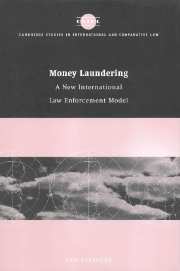Book contents
- Frontmatter
- Contents
- Preface
- Table of treaties and agreements
- List of abbreviations
- Part I New instruments in the fight against acquisitive crime: confiscation of proceeds from crime and criminalisation of money laundering
- Part II The prevention of money laundering
- Part III Jurisdiction over money laundering
- 8 Various types of jurisdictional problem in the fight against money laundering
- 9 Territorial jurisdiction in respect of money laundering offences
- 10 Extra-territorial jurisdiction in respect of money laundering offences
- Part IV International co-operation in combating money laundering
- Epilogue
- Bibliography
- Index
- CAMBRIDGE STUDIES IN INTERNATIONAL AND COMPARATIVE LAW
10 - Extra-territorial jurisdiction in respect of money laundering offences
Published online by Cambridge University Press: 16 October 2009
- Frontmatter
- Contents
- Preface
- Table of treaties and agreements
- List of abbreviations
- Part I New instruments in the fight against acquisitive crime: confiscation of proceeds from crime and criminalisation of money laundering
- Part II The prevention of money laundering
- Part III Jurisdiction over money laundering
- 8 Various types of jurisdictional problem in the fight against money laundering
- 9 Territorial jurisdiction in respect of money laundering offences
- 10 Extra-territorial jurisdiction in respect of money laundering offences
- Part IV International co-operation in combating money laundering
- Epilogue
- Bibliography
- Index
- CAMBRIDGE STUDIES IN INTERNATIONAL AND COMPARATIVE LAW
Summary
In the first chapter of Part 3, increasing globalisation was marked as a factor which favours increased use of extra-territorial jurisdiction bases. In Chapter 9 it was shown that, in defiance of this globalisation, many states seem to base their anti-money laundering activities primarily on the territoriality principle. In this chapter, the possible use of extra-territorial jurisdiction in respect of money laundering offences will be investigated. The most important jurisdiction basis in this respect is undoubtedly the nationality principle. Finally, an attempt will be made to shed some light on the reasons for the strong emphasis on the territoriality principle compared to other jurisdiction principles.
Jurisdiction on the basis of the nationality principle
The extraterritorial jurisdiction basis that is most likely to play a role of some importance in the international fight against money laundering is the nationality principle. The nationality (or active personality) principle is underpinned by two rationales, the first being that it serves international solidarity and the interest of the individual in that he can better defend himself in his own country and, in the case of a conviction, stands a better chance of rehabilitation. In the context of money laundering, the second rationale is more likely to be the driving force behind the recourse to the nationality principle in the fight against money laundering: it provides a state with a kind of supervision over conduct by its nationals abroad: rei publicae interest bonos subditos habere. This concern may hold not only in respect of individuals but also in respect of corporations, notably financial institutions. To an even larger extent than physical persons, juridical persons are internationally active.
- Type
- Chapter
- Information
- Money LaunderingA New International Law Enforcement Model, pp. 232 - 248Publisher: Cambridge University PressPrint publication year: 2000



